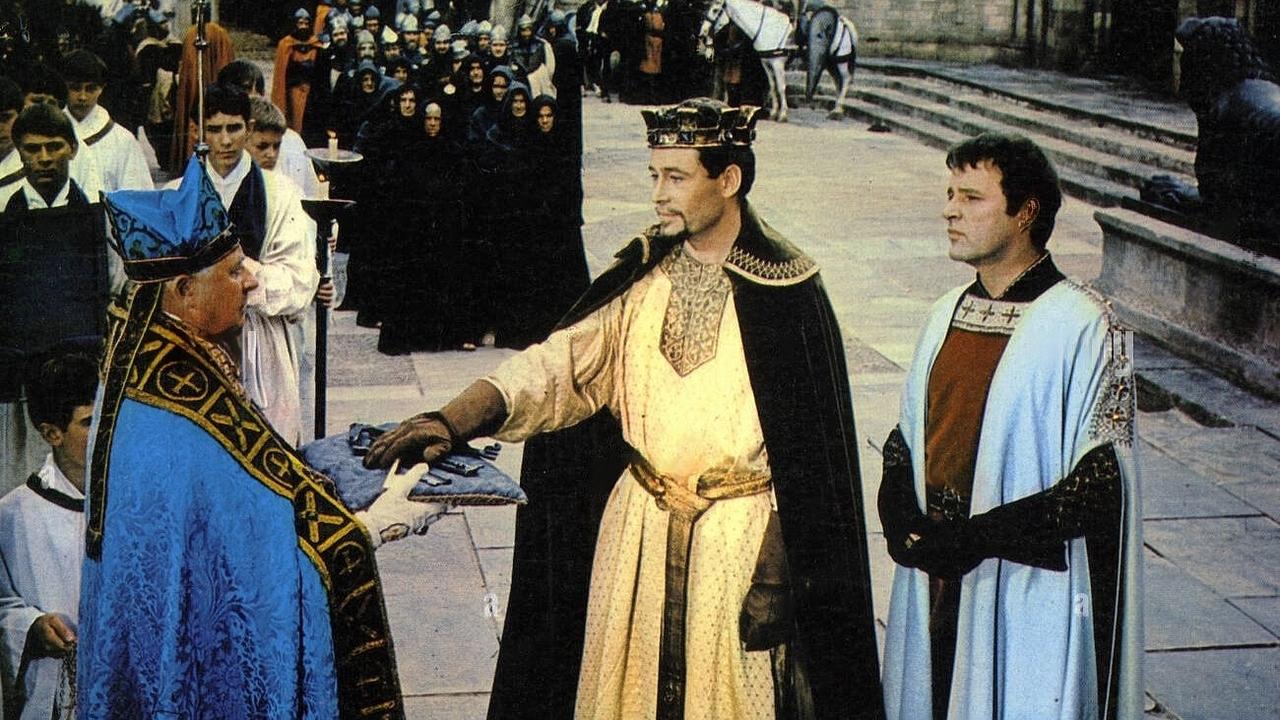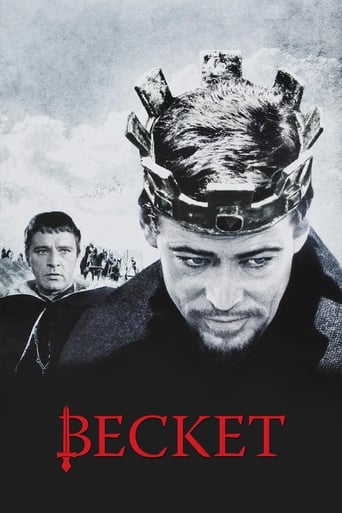Hellen
I like the storyline of this show,it attract me so much
Libramedi
Intense, gripping, stylish and poignant
Ketrivie
It isn't all that great, actually. Really cheesy and very predicable of how certain scenes are gonna turn play out. However, I guess that's the charm of it all, because I would consider this one of my guilty pleasures.
Phillipa
Strong acting helps the film overcome an uncertain premise and create characters that hold our attention absolutely.
HotToastyRag
Becket is a man's movie. I don't think there are any women in the cast, or if there are, they have very insignificant parts. My brother, who has been known to tolerate rather than enjoy old movies, loved this movie. Whenever he talks about the classic film genre, he says, "You know what movie I liked? Becket!" The only bad part of the movie is what happened during the 1965 awards season. Richard Burton and Peter O'Toole were repeatedly pitted against each other in the Best Actor category. If only tied awards were more prevalent. Both men were nominated for the 1965 Oscar, and Rex Harrison ran away with the gold for his bored, flippant, tired, lousy performance in My Fair Lady. If that doesn't make you lose faith in the Academy, just wait two more years for Richard Burton to once again lose the gold in Who's Afraid of Virginia Woolf? to Paul Scofield in A Man for All Seasons. Just terrible.Anyway, back to Becket. If you like Richard Burton or Peter O'Toole, you need to watch it. Their performances are fantastic beyond description; you could watch it ten times and still come out with a tie as to who gave a better performance. Pete plays King Henry II, and Dick plays Becket. The king and the archbishop differ in their core beliefs, but will religion get in the way of their friendship? Will Becket compromise his morals to stay a loyal friend to the king? The historical friendship between the two real life figures is written out thoughtfully and rivetingly, even though the story was originally based off a play. Yes, it's wordy, but none of the speeches are wasteful or boring. It's incredibly thought-provoking, constantly pulling the audience both ways. Both characters are likable and both sides of the debate are understandable. And since the actors were famous friends offscreen, it's that much more enjoyable to watch them verbally spar with each other on screen. It's a true masterpiece.
cinemajesty
"Becket", Peter Glenville's film interpretation of Jean Anoulih's stage play released spring 1964 lives from his star-vehicle main characters portrayed by Richard Burton and Peter O'Toole, given Henry II of England a face for an anamorphic cinema-scope canvas.Henry II. arrives on Canterbury church sight, the year approximately 1066. The ambiance shows power of the clergy, here monks in brown robes, towards the English Throne. A flashback rolls out, revealing Becket & The King as brothers in crime. They are on rampage tour through the English landscape drunk and excited. The king seduces a peasant girl and steals her virginity. Despite Henry II, Becket loves living and respects life itself. The film unfolds the idea of life through two contradicting actors performing their version of each one's character.Burton and O'Toole are the real treasures of the picture with a oil-paint canvas like cinematography, minimal invasive camera movement and the occasional low-angle work. The ring with the great seal of England is given to Becket by the King, who snappy completes "Don't lose it or we need all move back to the Normandy." Peter O'Toole performs Henry II. as a playboy with will and focus. His character battles the members of the church for money in demanding risen taxes to fight the French. The king gives away a peasent girl in his own right as in-official slave trader to Becket, followed by a major feasting in the castle's main hall with a food & drink overload concluding in maximum vast before Henry II realizes Becket as a deacon at his side.At running time mark 52mins 00sec (PAL version) the King makes Becket the Arch-Bishop of England, leading to a power ascension within his kingdom, pointing out to Becket: "The Dye is cast. Make the most of it", not realizing that he cast off a life-threatening battle between King & Arch-Bishop, which becomes the main theme of "Becket". Richard Burton's character goes through a transformation from the King's friend / servant to head of the clergy. Nevertheless he must confess to been weak and self-indulging by seeking only his own benefit and personal pleasure. When at running time mark 01h 09mins 00sec, Richard Burton performs the prayer for his earthly sins, Peter Glenville's adaptation of "Becket" arrives in full bloom of non-stop conflicting between two powerhouse performers.Peter O'Toole's interpretation of Henry II shows constant temper, charging his power from food & drink infusion. The women pampered and stuck in the castle's chambers are the only ones who dare to distort and controvert the king. Right before the Intermission break at 1h 19min. 00sec., an ominous Lord Gilbert gets ex-communicated by Arch-Bishop Becket, which initiates the twist from friendship to battling each other to the death. Henry II schemes to accuse Becket of treacherous embezzlement regarding the King's savings. In return Becket accuses Henry II to be a Libertine. Becket in fully-charged of pride curses Henry II to become ex-communicated and an outcast.A revenge theme sets in over the battle of institutions. In return Henry II summons Becket to the court of law, declaring Becket an enemy to the crone. Director Peter Glenville handles the pinball game between the main characters with utmost precision with lacking continuously digging deeper into the King's psyche with character punch lines as "I don't like my children" as the King states to his wife. Nevertheless Henry II thanks his mother for given birth to him and correcting his wife of being absent at his physical side in which he learns to rule alone. Richard Burton's character counter-strikes with "I will be judged by the pope alone", in which he declares Total War to the English crone.Under the tightening noose, Becket has no choice accepting the pope's suggestion to do Monastry work, taking the easy way out in a life as monk in almost luxury manner before he is allowed to return to England under amour by the French King Louis VII, ingeniously performed by John Gielgud as a lively gay character. Goeffrey Unsworth plain, stage-like cinematography stays uneventful. All the film's power lies in the hands of the actors Richard Burton & Peter O'Toole, whose on screen chemistry comes to catharsis in an EXT. scene on a beach at Dover's.The quintessence of the King's character evolution takes shape that people kill what they love most, out of fear of losing it or to be touched by it physically as well as spiritually. So Henry II sends his knights to murder drunken Becket on holy grounds at Canterbury. The arch-bishop summons his dying day as Black World, getting dressed with red under-gown covered in white and gold. The servant, who presents Becket with a silver cross before taking the knight's with stab, trying to protect the arch-bishop. Becket on his knees, giving no resistance towards the King's knights. He gets slashed into pieces.Flashing forward to opening sequence, Henry II receives whiplashes by monks to eternity in front of Becket's grave, seeking redemption of a murdering his only friend. Again the cinematography in lighting and camera movement presents itself insufficient to prevail a test of time. The film concludes with Becket declared saint, revealing the the rotten desolated state of the world, but at least it pacifies the mob. The King leaves Canterbury as he came. The end.© 2017 Felix Alexander Dausend
Kirpianuscus
something magic defines Becket. the source is not the acting, the music, the costumes, atmosphere. but the silence. it does force to the fight for honor, to loyalty, to the friendship and to the final word of king. it is the heart of tension and the drawing of lead characters. Richard Burton does one of his memorable roles. but his role is like a coat for two. his Thomas Becket is great, convincing, touching, profound, vulnerable and profound human for the science of Peter O ' Toole to discover his Henri II as the runner to his precise destiny. it seems be the film of two great actors and that is its high virtue. but its status of memorable movie has deeper roots. because it becomes more than a remarkable play adaptation and sustain a generous message in brilliant manner. story of power and faith, it is good support of reflection about politics and its necessary limits.
David Conrad
This slow-paced film explores the love-hate relationship between a young, hedonistic King Henry II (Peter O'Toole) and his brooding, philosophical friend Thomas Becket (Richard Burton). The casting seems perfect, but O'Toole is often caught chewing the scenery and there is surprisingly little chemistry between he and Burton. Both of these actors are rightly associated with challenging and multifaceted roles, usually of flawed, frustrated antiheroes who embrace but undermine traditional notions of masculinity. That is precisely what the script of "Becket" aims for, but here the dialogue is overwrought and belabored, and the characterizations are one-dimensional. O'Toole would reprise the character of Henry II to much greater effect in "The Lion in Winter" (1968), which features a more forceful script and better performances.

